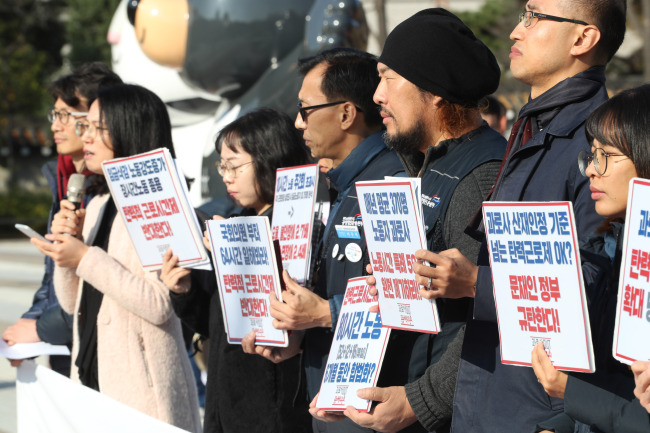Local companies are struggling to adapt to a shorter workweek and calling for greater flexibility in its application, but their calls face vehement objections from the country’s umbrella labor groups.
Under a recently revised law, the maximum weekly working hours have been reduced to 52 from 68. The revisions took effect in July for companies with 300 or more employees and will also affect smaller businesses in the coming years.
There seems to be public consensus here that Korea’s notoriously long working hours should be reduced to help people achieve a better balance between work and family life. But concerns are growing that the inflexible application of the new workweek regulations could intensify difficulties faced by local businesses, which are already troubled under the labor-friendly measures taken by President Moon Jae-in’s administration over the past year.
Employers have asked for wider leeway to increase or decrease working hours in accordance with seasonal changes in the workload.
“We have a large fluctuation in production, affected by the industrial atmosphere and orders from major chipmakers,” said an executive of a local semiconductor equipment company, calling for a more subtle approach to suit the specific conditions of each industry.
For instance, it makes sense for air conditioner parts makers to increase working hours to more than 52 hours a week during the summer season but decrease them in the winter.
Under the current rules, companies are allowed to adjust working hours flexibly for up to two weeks at a time without consent from unionized workers. But to set flexible working hours for a longer time span -- no more than three months -- a written agreement between labor and management is necessary.
The business community hopes that flexible working hours will be implemented on a yearly basis.
The government has a six-month moratorium in place, during which companies with 300 or more employees will not be penalized for failing to implement the shortened workweek. This means that, beginning in January, many of those businesses run the risk of being penalized if they disregard the reduced workweek to avoid disruptions in production and other corporate activity.
“The problem is not the shorter workweek itself, but its rigid application,” said Sung Tae-yoon, an economics professor at Yonsei University.
“It is necessary to find a more realistic approach to applying flexible working hours,” he added.
The government and both the ruling and opposition parties share the view that the shorter workweek needs to be put into practice in a flexible way.
“To help alleviate difficulties faced by local companies, we agreed to (draft) supplementary legislation to expand flexibility in working hours,” read a joint statement issued by five political parties last week after their leaders held a policy consultative meeting with President Moon.
The main opposition Liberty Korea Party has suggested that flexible working hours be applied on a yearly basis, while the ruling Democratic Party of Korea wants a six-month period of application.
The country’s two major umbrella labor groups -- the Korean Confederation of Trade Unions and the Federation of Korean Trade Unions -- have opposed the flexible implementation of the shortened workweek, arguing that it would worsen working conditions for employees.
The KCTU, the more militant of the two groups, plans to go on a general strike next week in opposition to any flexible approach to the 52-hour workweek as well as to protest other moves by the Moon administration, which it says will hurt labor rights.
This intransigent stance seems to be annoying the Moon government and the ruling party, which have already taken a string of pro-labor steps in an effort to push ahead with their income-led growth policy.
Im Jong-seok, the presidential chief of staff, said during a parliamentary audit last week that the KCTU and the Korea Teachers and Educational Workers’ Union “are no longer socially underprivileged” and should now take their own share of social responsibility.
A day after Im made the remarks, Rep. Hong Young-pyo, the ruling party’s floor leader, urged labor unions to participate in discussions to improve social and economic conditions rather than repeatedly raising objections.
Observers are keeping a close eye on the Moon government to see whether it decides to push through a more flexible approach to the implementation of the shortened workweek -- potentially a signal of changing relations between the government and the labor-rights community.
Intermediary companies -- those with staff numbers only slightly over the 300 mark -- have suffered most severely from the negative effects of reduced working hours. Many of their employees, especially skilled employees, have moved to smaller companies that are not yet subject to the revised rules because they can earn more overtime wages.
Some intermediary firms have split themselves into multiple units to avoid implementing the 52-hour maximum workweek in a bid to retain workers by guaranteeing that their wages will not decrease.
In the coming years, smaller businesses are set to face similar problems as they will be subject to the shortened workweek, experts say. While they will need to fill posts left vacant after the departure of skilled workers, young job seekers are unlikely to apply for them, hoping instead to land jobs at big corporations or in the public sector.
In a recent survey of small and medium-sized enterprises in the country, conducted by the Korea Small Business Institute, more than 60 percent said labor shortages would worsen in the coming years through 2022. Slightly over 11 percent expected to see an improvement.
Experts say it is also necessary to reschedule the implementation of the shorter workweek by industrial sector.
By Kim Kyung-ho
(
khkim@heraldcorp.com)






![[Herald Interview] 'Trump will use tariffs as first line of defense for American manufacturing'](http://res.heraldm.com/phpwas/restmb_idxmake.php?idx=644&simg=/content/image/2024/11/26/20241126050017_0.jpg)
![[Exclusive] Hyundai Mobis eyes closer ties with BYD](http://res.heraldm.com/phpwas/restmb_idxmake.php?idx=644&simg=/content/image/2024/11/25/20241125050044_0.jpg)
